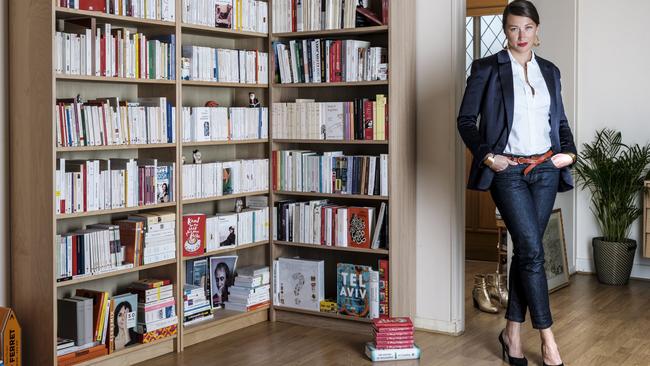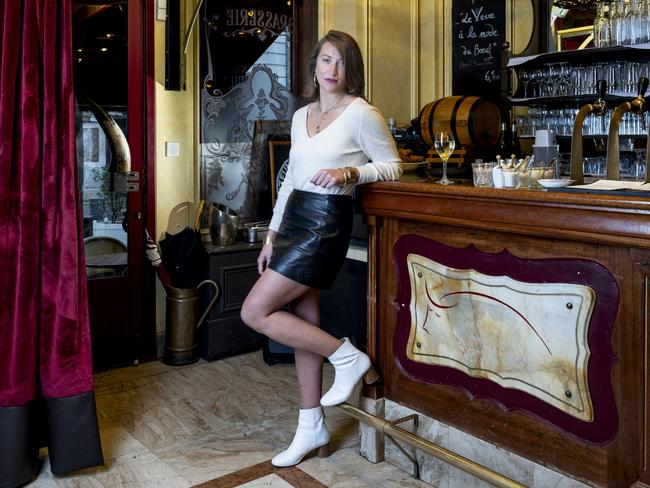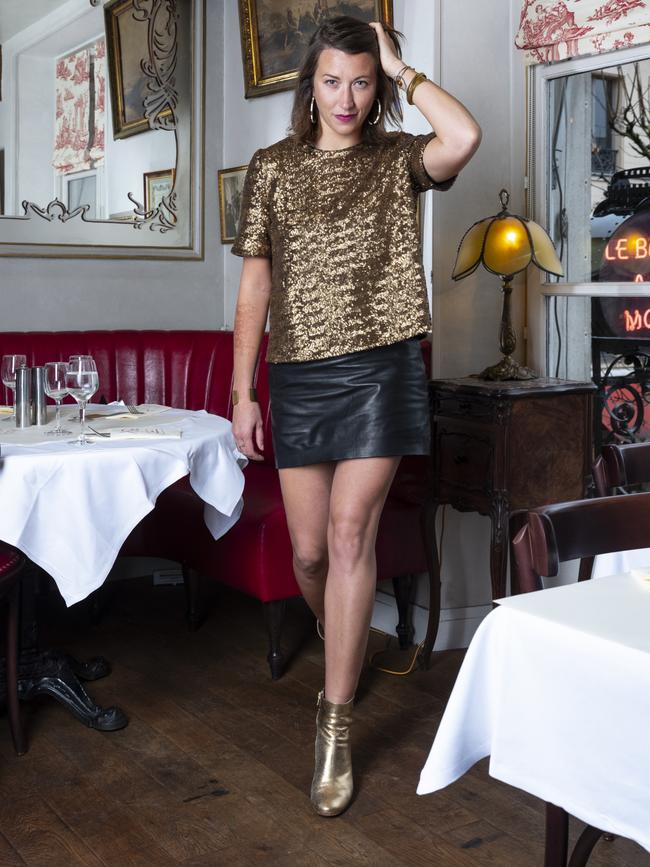Marie Robert: making philosophy sexy again amid a world in crisis
Got a problem with your ex? Read Kant. Hate your boss? Try Foucault. Marie Robert is the cool new face of philosophy.

If you’re the sort of person who is often told, “You think too much”, Marie Robert may be your salvation. She playfully suggests an alternative theory: maybe the problem is that other people don’t think enough. Given that she’s not only set up France’s first “philosophy primary schools” but has also, in the space of just the past two years, released philosophy from its ivory tower and brought it to the French masses by way of not one but two best-selling books, it would seem she is in a position to know.
Philosophy is core to French identity, but its modern-day proponents in France seem often to consider themselves as intellectually superior exceptions to the country’s egalitarian values.
By contrast, Robert, raves the French daily Le Figaro, is “la philo pour tous”. On French national radio, under program titles such as Philosophie a la cool avec Marie Robert, you’ll hear her spirited analysis on subjects ranging from the gilets jaunes (France’s yellow jacket movement) to how to harness Rene Descartes for those low-confidence days. Her second book is peaking at No 1 in the French bestseller list and the country’s glossy magazines have come to agree with Robert’s claim that, released from the possessive, lofty and pretentious grasp of France’s male public intellectuals, “philosophie est sexy”.
Her first book is called Keep it Together: Philosophy for Everyday Emergencies. It’s been translated into 15 languages. In it she takes the theories of 12 philosophers to explore possible solutions to questions you might more usually find in an advice column or discuss with a therapist. Can’t get over an ex? Read Kant on humanity’s place in the world. Caught up in a meaningless materialistic existence? Spinoza’s Ethics should help.
Every morning Robert posts a philosophical talking point on Instagram and you can throw in your own considered opinion as the debate bubbles up in the comments section. (What is love and was Plato right about it? Discuss.) I meet Robert in Paris’s Latin Quarter, opposite the Sorbonne University where she studied for her philosophy degree and masters. She became a lecturer, but feeling straitjacketed by the system, she went off on a tangent that, interestingly, her famous male peers have responded to with deafening silence. The Sorbonne’s philosophy degrees are the most prestigious in France. Most of its alumni are men, she explains. If they pursue a career in the discipline and become successful they’re perceived as intellectual gods, often wheeled out, groomed and tanned, to pass comment on the issues of the day.
Even physically she stands out against this norm, just for being a female, ebullient and under 60 (Robert is 34). She’s stylish, funny and bright, passionate to the point of excitability. Growing up, the young Robert was an intellectually gifted but emotional child who displayed behavioural peculiarities from the age of five. These included dyslexia, dyspraxia and a terror of death, behaviours that she’s confident would be diagnosed as serious disorders by experts today, to be medicated and ironed out in therapy. She was 15 when she discovered philosophy at school. “Philosophy saved my life,” she says. “It gave me permission to be who I am.”
There’s no obvious trace of the “problem” child she used to be. “I’m calm but animated by a sort of ‘rage’,” she says. “I don’t have time for people who think that philosophy is an object that belongs only to a certain category of individuals. Philosophy can be dry and demanding, but it belongs to everyone and not to an elite.”
In some ways she personifies the link she wants to make, between ordinary people and obscure ideas ordinary people may not understand. She’ll talk about everyday things that her male peers don’t — notably, emotions and relationships — but will then come out with a comment such as, “When something stressful happens, I read Jankelevitch on death.” (The son of Russian Jewish immigrants, he joined the French Resistance and was appointed the chair of moral philosophy at the Sorbonne — I looked it up. “Forgiveness died in the death camps,” is his most famous quote.)
If, for you, the word philosophy stirs up images of, say, Martin Amis in his great-issues-of-our-time phase discussing his IQ with Brian Eno while Sting plays the lute in the background, you have Marie Robert’s sympathy. The pretentiousness situation is far worse in France, she says, all the more so for it being manufactured as a way to intimidate ordinary people into feeling stupid.
“The intellectuals love how difficult philosophy is. It is made deliberately inaccessible. The texts are hard and obscure, the professors are severe.” She laughs. “It’s as if you have to prove you deserve to study philosophy. And on top of that, here in France, philosophy is very male-dominated.”

Doing her master’s, she was one of two women in a class of 32. “In France, philosophy is attributed to rationality and rationality is still seen as a male characteristic. It’s a mark of authority, power, reason. They have a reputation of being very intelligent. Men ‘to be listened to’. It’s terrible! I think they think of me as amusante. I don’t get credibility because I’m a girl, I smile and I’m a bit enthusiastic.”
Alongside the books and schools, she’s a university lecturer and runs philosophy conferences, so it’s odd that Philosophie, France’s leading philosophy magazine, has never once mentioned her. “As if I didn’t exist,” she says. “It’s crazy. There’s something dishonest about it.” She puts forward a hypothesis, which will no doubt unsettle the powers that be at Philosophie all the more.
“French people are scared of their emotions. It’s not as bad as ‘Keep Calm and Carry On’, but we’re ill at ease. We don’t know what to do with our feelings. I think that’s what is at the root of this. We have a lot of political philosophy. But intimacy, love, family, responsibility, culpability — they are seen as ‘not philosophical enough’ and they’ve been abandoned as ‘less serious’. We endlessly analyse the political significance of the gilets jaunes, but we never talk about the anger.”
To understand why any of this matters, it is important to understand the extent to which philosophy is embedded in French identity across all parts of society, even in pop culture.
There’s the cult existentialism of Sartre and Foucault, of course. Further back, in the Age of Enlightenment, the ideas of Voltaire, Diderot and Rousseau inspired the French Revolution. “In France it’s slightly strange,” says Robert. “Because even if you know nothing about philosophy, you know the philosophers. You’re always quoting them without really understanding what they mean.
“They will send a text message to their children: ‘Become who you are’ — that’s Nietzsche. Or wear T-shirts with bits of philosophy written on them: ‘When I dance, I dance’ — that’s a phrase from Montaigne. There’s a pronounced connection between being French and philosophy. I meet lots of people at readings who say, ‘I’ve never studied philosophy,’ but at the same time they know Descartes. In our school system, everyone has to do a year of ‘philo’ before the baccalaureate. It’s seen as a mark of maturity. In France, it’s almost a rite of passage.
“It’s a huge national ritual. Every year on June 15 — that’s the day of the philosophy baccalaureate exam — the radio and television stations all have a philosophy theme. It’s mad. The whole of France is involved.”
I want to try out the philosopher-agony aunt concept, so I think up some universal life problems for Robert. I hate my boss: “Foucault. You have to learn to oppose, say no and disobey. He analyses power relations and teaches us, without resigning, to assert yourself.” My partner has left me for someone else: “Kant, of course. Love is unreasonable and takes us away from morality. It does not console, but it allows you to find your senses. Or Plato: if your partner left you, it’s because they’re not your soulmate.”
It’s a good game, and makes me want to bury my head in some philosophy treatises so I can contribute something beyond my Sartre go-to, “Hell is other people.” Robert is encouraging.
“There are no right answers in philosophy,” Robert says. “Anyone can do it. And everyone can benefit from it, personally as much as intellectually. That’s what’s so problematic about personal development, because it’s very methodological: ‘Do this,’ ‘Do that.’ ” I can see there’s an idea forming rapidly in her brain: philo-therapy. Everyone in Paris sees a “psych”; why not see a “philo” instead?
“Philosophy is about comprehending the present. You’re reflecting on universal themes, whether it’s guilt or ethics. It’s the difference between ‘Who am I?’ and ‘Who are we?’ ”
She wakes every morning at 6.20 and meditates for 20 minutes on a philosophical theme. “I think my biggest anxiety is to be denied the right to think or reflect. It really is the thing that makes me most anxious. On the rare occasions I don’t do it, when I’m in a rush, that plunges me very quickly into anxiety, which takes me over for the whole day. So the first thing I do when I wake up is say to myself, ‘Think about something.’ ”
Her two schools are in Paris and Marseilles. They’re for primary-age children who have been labelled, as Robert was at their age, “different” or “problematic”. They’re Montessori schools. This was her husband’s idea. “In France every child is diagnosed with something these days,” she says. “They are put on the spectrum if they’re hyperactive or they are put on medication aged six. And I think, ‘Let’s stop this massacre.’ They don’t need a diagnosis. We need to understand their way of thinking.”

Her approach to education is often counterintuitive. Mobile phones are now banned in French schools. Robert’s students can bring their tech to school and they’ll spend a lesson debating the role of phones in society. They’ll debate democracy — starting point: is a harsh leader worse than having no leader?
She talks about a three-year-old boy at her Paris school who bit a girl in class. “I said, ‘Why did you bite her?’ And he said, ‘Because I think she’s very stupid.’ And I said, ‘Well, that’s not stupidity. What does stupid mean to you? And he said, ‘When someone isn’t what I want them to be.’ So with a three-year-old child, I was having a truly philosophical discussion. Because it’s a philosophical question — should others adapt themselves to us or should we adapt ourselves to them? What’s really pertinent is how even in the first year of school, children are able to deal with complexity and nuance. They are completely capable of having their own opinions, understanding an argument and to argue against the opinions of others. They just need a space where they’re allowed to speak. Giving a diagnosis and medication suits everyone; it’s a way of tidying things up. It’s easier for teachers and for parents if the child is completely anaesthetised by medication.”
She’s grateful to her parents for having protected her from the opinions of other adults; otherwise, she says, she would have been “completely reprogrammed”.
“If I had listened to people, I wouldn’t be where I am today. It’s something I feel really proud of. I always say to the children, ‘Don’t listen. Be yourselves. Disobey. Ignore all the predictions. ‘Different’ people are scary because they upset systems. They force us to question our standards. It is an effort that parents, teachers or society do not always want to make.”
Recently she was shopping when she saw a mother chiding her child for “asking so many questions”.
“Oh, that tore me up inside,” says Robert. “I wanted to kidnap the child. People want their children to be intelligent, but not too intelligent. There is something risky about having a child who asks questions. It’s threatening. Because they ask questions about things that frighten you. You don’t know where it’s going to go.”
Maybe Robert’s books will be as successful around the world as in France and there’ll be an intellectual revolution.
“I think,” offers Robert, “that there is something that people find unsettling about the idea of thinking a lot, or analysing.”
The repackaging of philosophy as a personal relational tool could go down well, though. Robert says that more and more people send her private messages about their problems, usually about love or family.
“There are two questions that always come up. ‘When do you know when to split up with someone?’ And, ‘Do I have a duty to speak to my parents?’ Incredible. I had no idea that’s an issue for so many people.” It’s a meaty philosophical question too: “It’s a question of duty and guilt. What is more unbearable: seeing your parents, or the guilt of not seeing your parents?”
Perhaps the world beyond France harnesses philosophy in the time-honoured way: as a method to ridicule whatever newfangled trend is in danger of entering the mainstream. Maybe mindfulness, for example, has risen above its station. Maybe it needs to be put back in its box. Robert can’t do mindfulness. “For me, thinking really is vital. Without philosophy, I feel denied in my identity. I think and I need to think. The more people say, ‘Let go of your thoughts,’ the more dispossessed I feel.”
Think more. Empty your mind less. And where can we buy the T-shirt?
Keep It Together: Philosophy for Everyday Emergencies by Marie Robert is published by Scribe ($29.99).
